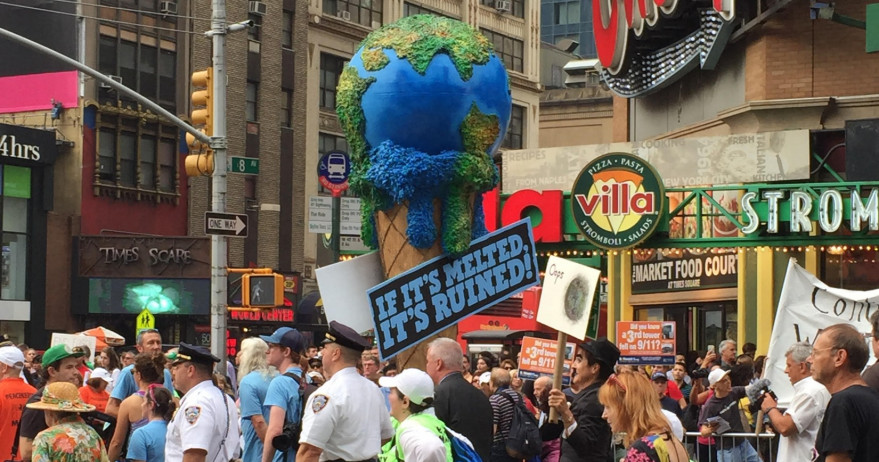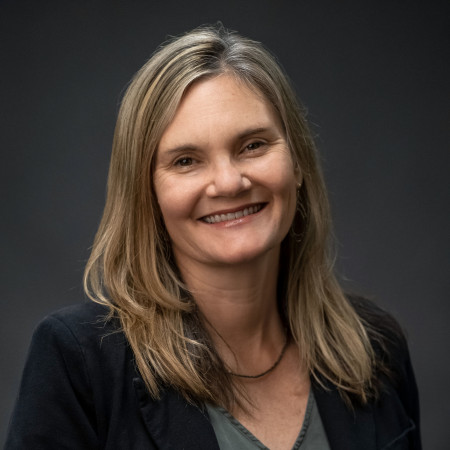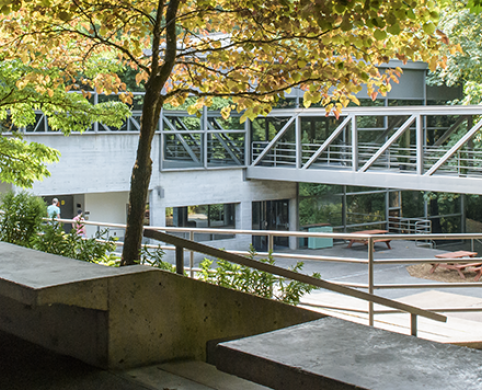Environmental Justice and Sustainability

Lawyers and policymakers play a key role in fostering more equitable and
sustainable societies around the world. At Lewis & Clark, we offer stand-alone courses on both environmental justice and sustainability, and also integrate these issues into our broader environmental curriculum.
Practitioners advance environmental justice by working to ensure the fair treatment and meaningful involvement of all people, regardless of race, color, national origin, or income in the process of developing, implementing and enforcing environmental laws, regulations, and policies. They also seek to redress past harms caused by disparate application of these laws and policies, and ensure that the transition to a more sustainable, low carbon future does not leave anyone behind.
Advocates may also work on global environmental justice challenges, including responding to the climate crisis, ensuring equitable access to clean water, and preventing deforestation. Sustainability projects environmental justice into the future, devising ways to meet society’s present needs without compromising the ability of future generations to meet their own needs. Three basic principles guide sustainable decisions: social equity, economic feasibility, and environmental protection.
At Lewis & Clark, students interested in environmental justice and sustainability issues have the following opportunities:
Coursework
This will be an experiential course in which students engage in legal problems that lawyers handle to develop practical skills that will be useful regardless of what practice area students eventually choose. In this summer course using environmental facts and laws applying to Professor Ferrey’s real-world ‘Modules’/problems, students represent different sides in different disputes representing NGOs, regulated companies, or government agencies responsible for clean air, developing applicable skills:
- Discerning the federal/state legal split as to which level of government can regulate what aspects of the environment
- Re-argue in class the most cited Supreme Court precedent this century (a Clean Air Act case) using the actual briefs from the case, with legal teams on both sides of the case
- Navigate recent Supreme Court restrictions on the ability of government agencies (EPA) to regulate U.S. air emissions that cause climate change
- Explore the revitalization of common law creates claims on air pollution and climate
- As a law firm, try to avoid our client NGO’s air claim against a government agency getting tossed out on procedural grounds that the U.S. DoJ raises against any NGO environmental litigant, and how we avoid that as well as to recover our attorney fees from litigation
This course uses the Clean Water Act as the basis for a detailed consideration of a “command and control” regulatory program. Similarities and differences with the Clean Air Act and the Resource Conservation and Recovery Act are noted along the way.
This class takes an in-depth look at our greatest global environmental challenge, climate change, through a discussion of the international treaty regime.
It will begin with an overview of climate science and a discussion of the existing and expected impacts of climate change. Next, the course will discuss the United Nations Framework Convention on Climate Change (UNFCCC), the Kyoto Protocol, the Paris Agreement, and the associated Katowice rulebook. Time permitting, the course will discuss related hot topics such as climate and pipeline litigation and the role of non-state actors.
This class will discuss U.S. law and policy. It will begin with an overview of climate science and a discussion of the existing and expected impacts of climate change. Next, the course will discuss federal laws, regulations, and policies that regulate greenhouse gases and otherwise address climate change impacts. The course will then discuss state and local approaches to address climate change.
The class will also discuss climate change litigation in federal and state courts. Time permitting, the course will compare U.S. approaches to climate change law and policy in other countries.
The Environmental Justice movement demands fair treatment in the context of environmental protection for all people, regardless of race, ethnicity, gender, religious affiliation, economic status, national origin and education level. It looks at environmental issues through the lens of discrimination and assesses how that discrimination shapes both vulnerability and resilience. This course examines the Environmental Justice movement and the disproportionate impacts borne by vulnerable constituents in the domestic and international context of government regulation, corporate activity, climate and energy concerns, and environmental degradation. Readings include selected cases, law review articles, case studies, executive orders, legislation, and UN declarations.
In addition to the course texts and supplemental readings, we will also view select documentaries and hear from guest speakers from community-based organizations working to address racial and socioeconomic disparities.
Environmental Law is an essential course for anyone wanting to practice in this field.
This course provides a survey of federal environmental laws including the National Environmental Policy Act, the Endangered Species Act, the Clean Air Act, the Clean Water Act, and federal statutes dealing with hazardous substances.
Eating is arguably the most intimate relationship we have with the natural environment. It is a necessity that defines not only survival and human health, but also social values. This intricate web of needs and values has been recognized throughout the ages from Hippocrates, “the father of medicine,” admonishing, “The wise man should consider that health is the greatest of human blessings. Let your food be your medicine and your medicine be your food,” to the French revolutionary lawyer and the author of The Physiology of Taste, Jean Anthelme Brillat-Savarin, stating, “Tell me what you eat and I’ll tell you who you are.” As both Hippocrates and Brillat-Savarin recognized, implicit in the act of eating is the norm of consent in which the consumer of a food bases the act of consumption upon an understanding of the facts and implications of consuming that food.
The industrial agriculture system is also a fundamental cause of our current environmental degradation.
This class will provide an initial historical, legal and policy framework for industrial food and agriculture in the United States. The majority of the seminar will then broach this framework in the context of a variety of twenty-first century issues, with an emphasis on the connections of our food system to the natural world. Issues covered will include: food safety; labeling; pesticides; factory farms; organic standards; genetically engineered food and crops; and aquaculture.
This seminar examines the interaction of race and the law in society. It analyzes the intersection of race, culture, ethnicity, and the various institutions including the legal and political institutions.
The issues addressed include race and national security, race and the war on terror, race and medicine, race and international law, affirmative action and the U.S. military, racial profiling in a post-9/11 world, race and economic development, race and immigration, race and the criminal justice system, the Cold War and segregation, cultural differences and mandatory reporting of child abuse, the mixed race experience and the law, crimes and hate crimes, environmental racism, indigenous movements and international law, colonialism and international peacekeeping missions, and race and international conflicts.
Although difficult to define precisely, the concept of sustainability describes a way of meeting today’s needs without compromising the ability of future generations to likewise meet their requirements. In addition to its environmental aspects, sustainability also often encompasses ideas of equity and inclusiveness. Actors in both the private and public sectors have increasingly moved toward practicing and even requiring more sustainable ways of living, governing, and doing business.
Lawyers are beginning to serve clients who incorporate concepts of sustainability into their organizational goals, and are themselves considering ways to make their practices more sustainable. This course will examine - and help to define - how emerging concepts of sustainability are influencing and influenced by the law and legal practice.
Student interest and projects selected by participants will help to shape the course, but substantive topics addressed in the class will include topics such as green labeling and marketing; sustainable energy development; sustainable building and land-use practices; supply-chain sustainability requirements; socially responsible investing; triple-bottom line accounting and corporate reporting requirements; sustainability-related subsidies, tax credits and abatements; market-based environmental regulation; sustainability and government contracting; and sustainability and business regulation.
Mirroring developments in the field, the class will have an interdisciplinary focus. Guest speakers drawn from practicing attorneys, experts, and members of the business community will provide course participants with a real-world perspective on current developments in the field. The course also may include one or more field visits to sites away from the school over the course of the semester.
We also offer courses useful to students in any type of environmental practice including Environmental Litigation, Environmental Mediation and Negotiation, Environmental Law Moot Court, Administrative Law, and the Supreme Court and the Environment. Students may also opt to do an individual research project (paper) on a topic of interest in this area.
Alumni on the Front Lines
 Chief Sustainability, Resiliency & Innovation Officer, Metropolitan Water District of Southern California
Chief Sustainability, Resiliency & Innovation Officer, Metropolitan Water District of Southern CaliforniaEnsuring safe and reliable drinking water for communities throughout southern California is both a public health and an environmental imperative to me. I am inspired by the notion that the immediate climate impacts we face not only present our greatest challenge but also our greatest opportunity to rethink our relationship with nature and reverse historic injustices to people and the planet.
Doing the Work
Engage in real world environmental justice or sustainability issues through our on-campus clinics and institutes:
Earthrise Law Center Global Law Alliance Green Energy Institute
Featured News
Kelly House, MSL alum, wins Sierra Club enviro journalism award
Lewis & Clark MSL alum and Bridge Michigan reporter, Kelly House, is the winner of the 2023 Environmental Journalist Award from the Michigan chapter of the Sierra Club.
Environmental, Natural Resources, and Energy Law is located in Wood Hall on the Law Campus.
MSC: 51
email elaw@lclark.edu
voice 503-768-6784
Environmental, Natural Resources, and Energy Law
Lewis & Clark Law School
10101 S. Terwilliger Boulevard MSC 51
Portland OR 97219

